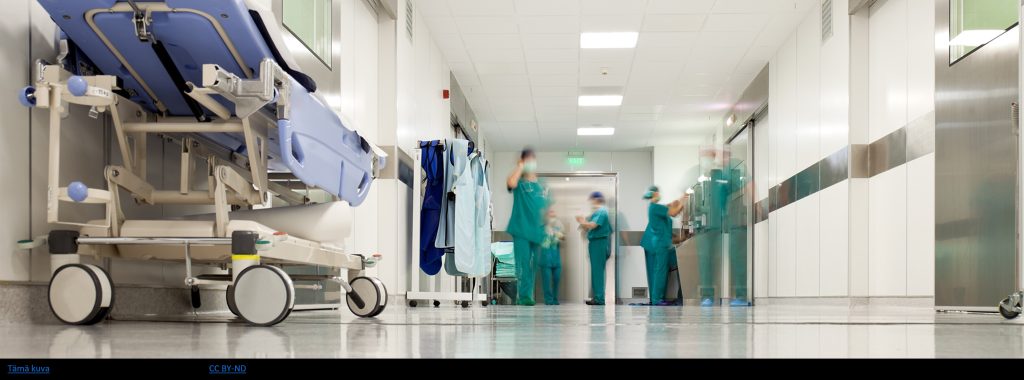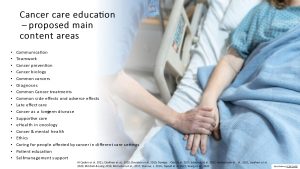Tunnetaitojen merkitys sosiaalisten taitojen pohjana, tasapainoisen elämän osana ja mielekkään elämän perustana on viime vuosina tunnustettu laajalti. Tunnetaidot mainitaan mm. Opetushallituksen laatimissa…
Tekijät | Authors

Cancer Care Education in Undergraduate Nursing Programs – Call for Action
All graduate nurses need to possess the fundamental, competences in caring for people with cancer and be prepared when encountering people with cancer. This requires action from higher education to equip graduating nursing students with the basic skills to appropriately respond to and care for people affected by cancer.
Non-communicable and lifestyle related diseases are among the biggest challenges facing EU health systems and countries. The NCDs represent major causes of disability, ill-health, health-related retirement, and premature death in the European Union, resulting in considerable social and economic costs (EU4Health programme 2021-2027). Cancer is one of the NCSs.
Cancer concerns all European countries as the increasing number of people diagnosed with cancer will pose a significant challenge to public health and will affect the lives of many. Without quick actions, cases are expected to increase in Europe by 24 percent by the year 2035 (EU Cancer Mission 2020). Furthermore, the prevention of cancer and ensuring the high level of treatment of those with cancer are central action areas in Europe (EU4Health 2021-2027; Cancer Mission, EU Beating Cancer Plan 2021).
Training and continues education to improve quality of care
The Europe’s Beating Cancer Plan highlights training and continuous education as one of the solutions to tackle the increasing cancer burden but also to influence quality care, provision of supportive care and support of quality of life of people affected by cancer.

Picture CC licensed: CC BY-NC-ND
Nurses interact with people at every point of their lifespan. Cancer survival is increasingly becoming a point of reference as people with cancer live longer with a cancer diagnosis or in many cases, live beyond cancer but still face long-term or permanent treatment-induced adverse events. Cancer is increasingly seen as a long-term condition.
Nurses encounter people at risk of cancer or undergoing cancer treatment, in survival or are in the palliative care phase of their illness. Caring for people with cancer is not therefore limited to specialist care units. Nurses need to be able to provide safe and high-quality care for those at risk of cancer, undergoing treatments, recovering or in palliative care.
Nursing students need to possess the necessary skills
All graduate nurses need to possess the necessary skills in caring for people with cancer and develop improved readiness to encounter people with cancer. However, undergraduate nursing students have perceived deficiencies in current education in preparing them to encounter and care for people affected by cancer (Lockhart et al. (2020). On the other hand, previous research indicates that educational interventions can improve the confidence and ability of nursing students to care for patients affected by cancer. (Lockhart et al. 2020; Hedenstrom et al. 2021.)
Today cancer treatments are rapidly evolving with advancements in technology. Thus, we should not expect graduating nurses to be oncology specialists. However, we need to equip them with the relevant basic skillset, abilities to learn more and find evidence-based information and increase their readiness to communicate with people affected by cancer.
Current education on cancer care requires attention
Therefore, we need to develop current education provision on cancer care. There are good examples on the main educational content for cancer care to work with (Figure 1).

Figure 1. Cancer care education content identified in recent literature (Reference list can be requested from authors)
However, the challenge is how to develop one area without causing pressure on other important areas in undergraduate nursing education. We are also aware that sometimes non-specialist nurse educators need to be able to teach and support learning in areas they may not be confident in. The same challenges unite us in different European countries, and it is our understanding that we need to find the solution together, in cross-border collaboration. Due to diversity from country to country, we also need to cooperate in the development and promotion of cancer nursing across Europe. What would be a better way than a standardized educational approach for all nurses in Europe?
References
Hedenstrom et al. 2021. Nursing Student Perceptions and Attitudes Toward Patients With Cancer After Education and Mentoring: Integrative Review. JMIR cancer, 7(3), e27854.
Lockhart et al. 2020. Oncology Resources for Students Enrolled in Pre-Licensure and Graduate Nursing Programs in the United States: A Scoping Review of the Literature. Seminars in oncology nursing, 36(3), 151026.
Research group CARE (CARE-tutkimusryhmä) :
– Master School and Nursing in cooperation








